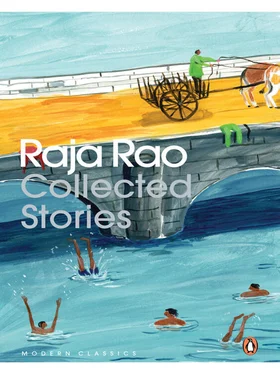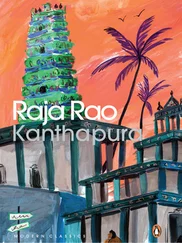Raja Rao - Collected Stories
Здесь есть возможность читать онлайн «Raja Rao - Collected Stories» весь текст электронной книги совершенно бесплатно (целиком полную версию без сокращений). В некоторых случаях можно слушать аудио, скачать через торрент в формате fb2 и присутствует краткое содержание. Год выпуска: 2014, Издательство: Penguin, Жанр: Классическая проза, на английском языке. Описание произведения, (предисловие) а так же отзывы посетителей доступны на портале библиотеки ЛибКат.
- Название:Collected Stories
- Автор:
- Издательство:Penguin
- Жанр:
- Год:2014
- ISBN:нет данных
- Рейтинг книги:5 / 5. Голосов: 1
-
Избранное:Добавить в избранное
- Отзывы:
-
Ваша оценка:
- 100
- 1
- 2
- 3
- 4
- 5
Collected Stories: краткое содержание, описание и аннотация
Предлагаем к чтению аннотацию, описание, краткое содержание или предисловие (зависит от того, что написал сам автор книги «Collected Stories»). Если вы не нашли необходимую информацию о книге — напишите в комментариях, мы постараемся отыскать её.
Collected Stories — читать онлайн бесплатно полную книгу (весь текст) целиком
Ниже представлен текст книги, разбитый по страницам. Система сохранения места последней прочитанной страницы, позволяет с удобством читать онлайн бесплатно книгу «Collected Stories», без необходимости каждый раз заново искать на чём Вы остановились. Поставьте закладку, и сможете в любой момент перейти на страницу, на которой закончили чтение.
Интервал:
Закладка:
The English language does not have sufficiently deep roots in India. It is therefore important for the writer to find his own individual style through which to express his world view. The reader, on his part, if he is not to misread the text, must get to know the writer’s epistemological viewpoint, or the sum total of beliefs, preconceptions and values which the writer shares with others within a socio — cultural context.
R. Parthasarathy
Saratoga Springs, New York
15 January 2014
Part I: From The Cow of the Barricades and Other Stories
AUTHOR’S FOREWORD
A name has a continuity, not our self. The Buddhists believe we jump from moment to moment and in between is the void beyond history. For, history is a concatenation of sparks on the void — someday like the serpent it must eat its tail and die too. Historically (and how long, long ago it was) I wrote these stories and I must own them. I own them.
Raja Rao
22 August 1946
Bombay
NARSIGA
HIS father had died of cholera, his mother of famine, and one sultry afternoon, a thin, tall woman, angry and effusive, turned up and calling herself his aunt carted him away into a distant village, where she took a husband for herself from one of the widower pariahs, ‘to bring up this poor orphan child’, she said. She worked in the houses husking the paddy, and he worked on the fields of the Master. But one day the Master said, ‘Why not come and stay in the ashram, Lingayya, we shall give you a hut!’ And Lingayya took his wife and his wife’s ‘orphan’ and settled down on the Master’s lands. She rose up early to light the bath-fire for the ashram boys, then she swept the floors, washed the vessels, and when she had nothing else to do, she took the Master’s child to play with the deer in the garden. Meanwhile, young Narsa, the orphan, played with the dogs or pulled the tails of tethered cows. He was nearly five years old, and very soon he would have to go out like the other boys to graze the cattle. But the Master said, ‘No. We shall buy him sheep, and he shall go out with the sheep.’ And at the next fair of spring, the Master bought him not only five sheep and three goats, but even a pair of country slippers and jacket, and every morning as the sun pierced through the thatch-hole and beat against his shut eyes, he would suddenly stretch out his wiry limbs and leap up like a frightened frog. Fixing his fallen dhoti about his bulging round stomach, he would brush back his scattered hair and walk out into the yard. Shiva! Shiva! The sun was already high up over the Rampur Hill, and the Master’s students were on the terrace for the morning meditation. Time to take the sheep into the woods! But the Master’s brother, the same who beat boozy servants and chastising husbands with a whip of supple, shining leather, caught him by his hair and said:
‘You little monkey, why do you grow hair like a sheep? If a thief were to catch you he would shear your head with a single stroke.’
Narsa said, ‘If a thief comes, I will slip beneath his feet and gallop back on my sheep. I can already ride on them.’
‘You little fool,’ cried the Master’s brother, touched and amused, and going back into his room, brought back a pair of long silvery scissors, and cut away Narsa’s swarthy hair. Only a little soft hair remained — such as the city people have — and the Master’s brother brought perfumed oils and combed Narsa’s head till it shone like black beads, and caressing it, Narsa went into the woods, the sheep before him.
Bow-legged Rangayya, who worked on the Cornerfieldsby-the-Canal, saw Narsa going into the woods with the sheep, and said, ‘Hè, you little monster! From when did you become an earning person? As though there were not enough of us wanting to live!’
‘What do I know, Uncle?’ tittered back Narsa. ‘The Master bought me sheep, and the Master’s brother cut off my hair— and they send me into the woods. . ’
‘Well, anyway, will you look after my own sheep, you son of my woman!’
‘Yes, Uncle. Oh yes, Uncle. . And how many sheep have you?’
‘I have — well I have three, my dear fellow. And if ever you bring them home alive evening after evening for six months, I shall give you a packet of sugar candies.’
‘Where are they — the sheep?’ asked Narsa, joyful. ‘Where are they — your sheep, Uncle?’ He already saw in front of him sheep after sheep, sheep that bleated and kicked and browsed over the rockless side of the blue Kantur Hill, sheep that wept and sneezed and dunged, and the mother-sheep that forgot their lambs, and the puffy, white ones, naughty and restless, that would so often stray away from the fold that he must hang a bell at their necks which would tingle-tingle-ta across the woods.
‘And a little one too, Uncle? Where are they — your sheep, Uncle?’
‘Oh, I’ll buy them at the next fair and bring them home. I’ll buy six of them.’
‘All right, Uncle,’ cried Narsa and took the sheep into the woods. He drove them into the bael woods, on the bank of the river, and left them by the railway embankments where the grass flourished between the gravel. Sometimes he drove them as far as the cactus growth by the village crematorium, for there the grass grew to unmeasured heights. One day he even saw a corpse getting burnt. There was such wonderful playfulness in the fire. He gazed and gazed at it from behind the cactus-over-the-mound, and when he went home, his aunt tore the skin off his back — for ‘the dead are not for the living’, she said.
When Uncle Sampanna had bought his sheep, and Carpenter Siddayya had bought a few too, Narsa drove into the woods more and more sheep. Sometimes he would ride on them, and go thinking himself one of those powerful gods that have animals for their vehicles. Now he would be Shiva, the Serpent-garlanded, and the knotted grass became the serpent and the long-horned goat the bull. And now he would ride on Rama’s chariot of flowers, a bael flower at the sheep’s tail, and two others behind its ears. And my, such a rain of flowers welcomed him back to Ayodhya! Sometimes, when it was too hot to leave the shade, he would take a little lamb and lull him to sleep as his aunt did when she was sober. But suddenly he would feel like sucking milk, and rushing to a mother sheep he would put his mouth to the teats and suck. The sheep would try to kick at him, but he would give it fresh grass, and suck teat after teat, beat his head against the udder and suck. Once he was satisfied he lay back on the grass — and laughed. Sometimes laughing he grew tired and slept till the sun was nearly set, and hearing the cawing of the evening crows, he would rise up and, gathering his sheep, hurry back home. Driving the sheep into the pen by the well, he would wash himself with a little water from the leather bucket and go into the hut. Dusk would have fallen and it would be hardly visible within. But he would feel himself into the bed-corner, fall flat on the floor in prostration before the gods — for the gods gave food, auntie said — and taking his bowl that was always by the hearth, he would sit out in the courtyard and munch his rice and pickles. Often auntie turned up after having lighted all the lamps in the ashram, and she always brought back a bowl of soup or a piece of city-sweets that the Mistress gave her when she was going home. She was a good woman, the Mistress! May she have a hundred male issues, auntie used to pray again and again.
‘Hè, orphan, come back, you little monkey!’
‘Yes, auntie. And what do you think I saw today? A huge big serpent, big and shining and hanging down into the canal. I took my stick and tried to fling him into the water. He jumped up like a little dog, but I took my stick and beat him and beat him till his head was torn off his body. But suddenly as I looked from the corpse to the rocks, the rocks to the fields, and the fields to the hills and the hills to the wide white skies, I was so beaten by fear that I ran over the bund moaning and shouting. What do you think of that, auntie?’
Читать дальшеИнтервал:
Закладка:
Похожие книги на «Collected Stories»
Представляем Вашему вниманию похожие книги на «Collected Stories» списком для выбора. Мы отобрали схожую по названию и смыслу литературу в надежде предоставить читателям больше вариантов отыскать новые, интересные, ещё непрочитанные произведения.
Обсуждение, отзывы о книге «Collected Stories» и просто собственные мнения читателей. Оставьте ваши комментарии, напишите, что Вы думаете о произведении, его смысле или главных героях. Укажите что конкретно понравилось, а что нет, и почему Вы так считаете.












